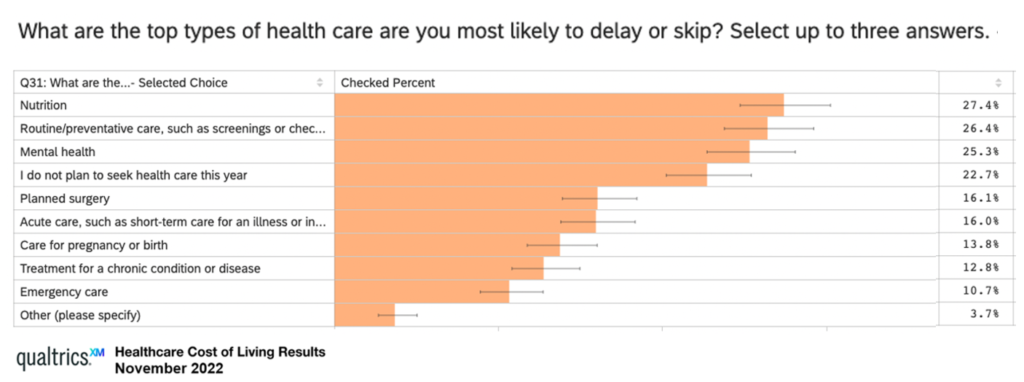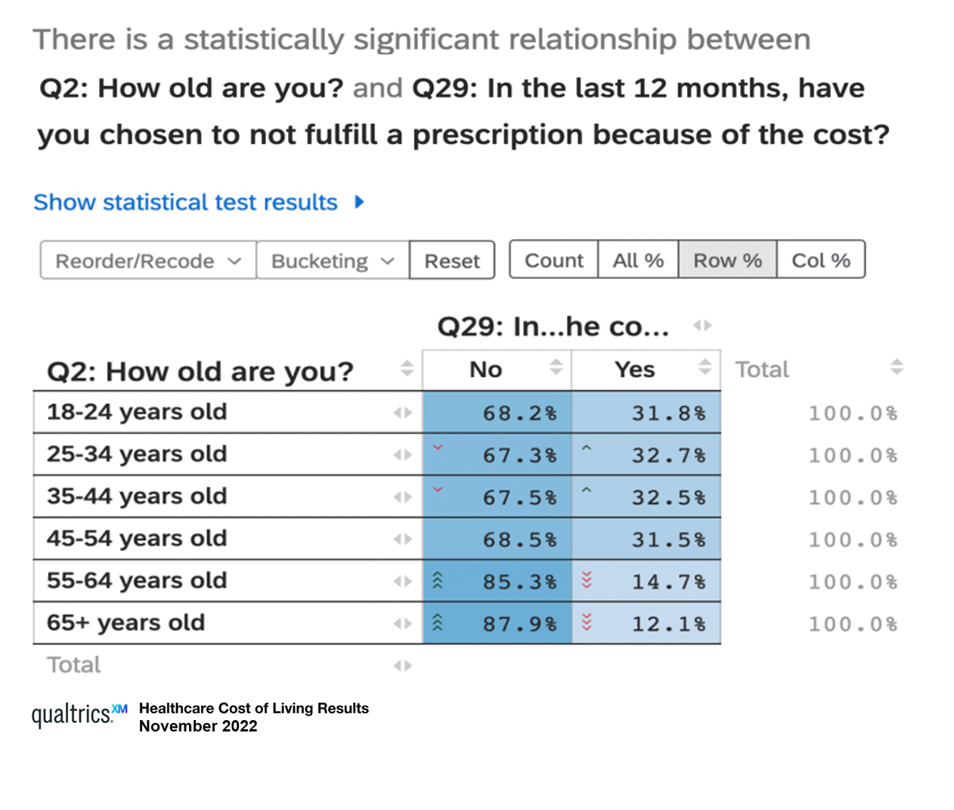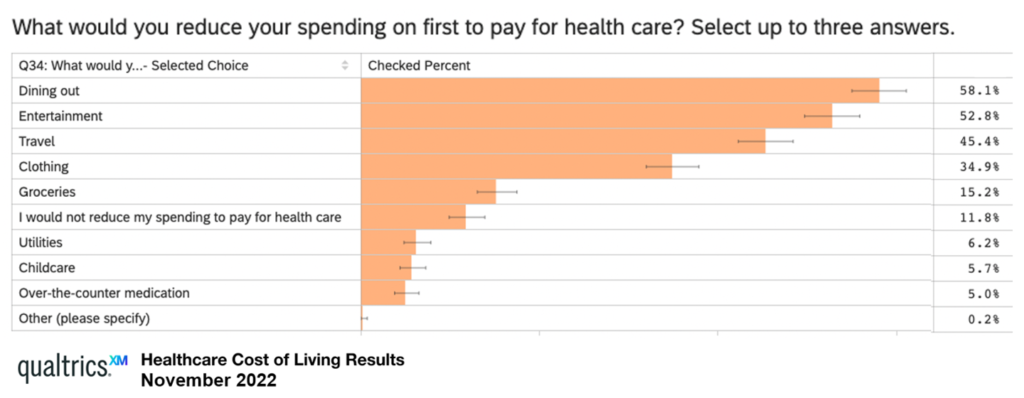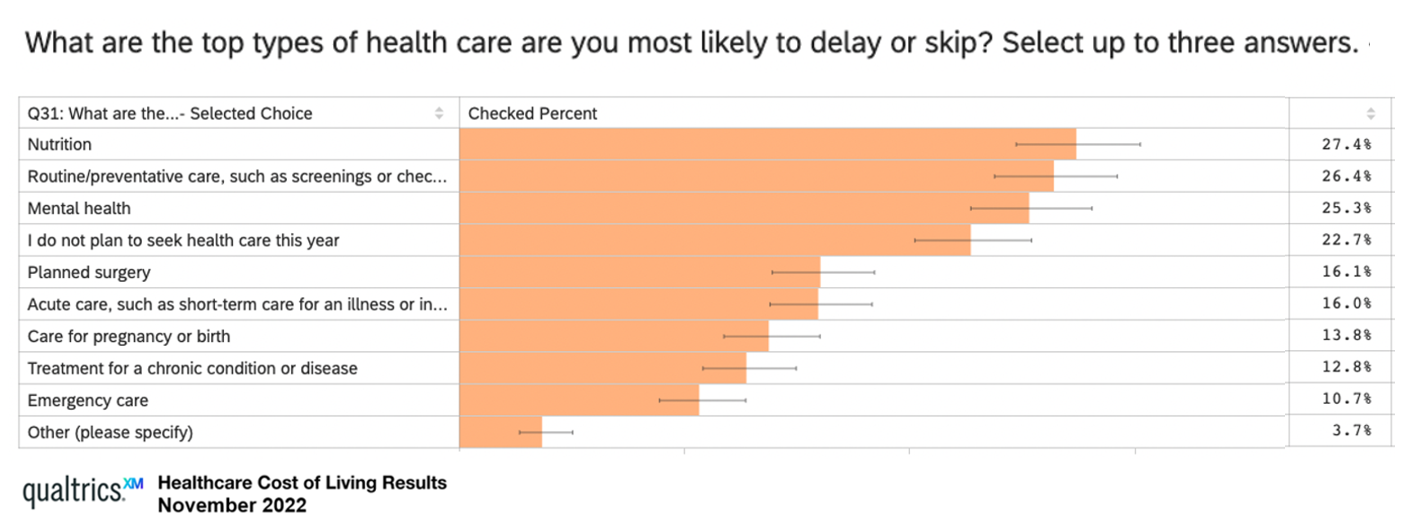Rising costs are the #1 reason U.S. health consumers are avoiding or delaying health care, replacing concerns about COVID-19, based on survey research from Qualtrics.

The company’s Healthcare Cost of Living survey research learned that 48% of U.S. adults chose to defer health care in 2022, split by
- 31% of consumers skipping care due to cost concerns, and,
- 17% of people delaying care who had concerns about the coronavirus.
Note the types of care delayed or skipped:
- Over 27% of people delayed care related to nutrition
- 26% delayed routine or preventive care, such as screenings or check-ups, and
- 25% delayed mental health care.
By far, the predominant reasons for skipping health care in the past year were the high cost of health services (45.5%) and overall higher prices (in general, 43.3%). The next-ranked answer was noted by about 1 in 5 consumers delaying health care saying, simply, “I don’t see a need for health care.”

The Healthcare Cost of Living also directly impacts patients-as-prescription drug payers. One in 4 U.S. adults chose not to fill a prescription drug due to the cost in the 12 months prior to the study (conducted August-September 2022).
Take a look at how prescription drug self-rationing varies by age: about 1 in 3 U.S. adults between 18 and 54 years of age chose not to fill a drug prescription in the past 12 months due to cost.
Avoiding a prescription fill dropped to about 15% for people between 55 and 64, and 12% for those 65 years and older, the table illustrates.
Qualtrics conducted the survey in August-September 2022 among 1,000 U.S. adults 18 years and older.

Health Populi’s Hot Points: Part of peoples’ understanding of their Healthcare Cost of Living is making tough decisions about household spending across categories balancing health and medicine with other line items.
The third chart tells us that patients-as-consumers would most likely sacrifice dining out, entertainment, and travel to be able to pay medical bills.
Qualtrics’ data bolsters our understanding of health care costs baked into the patient financial experience and, more broadly, the overall patient experience.
Marry that data point to Qualtrics’ finding discussed above that patients who delayed care were most likely to forego nutrition, prevention, and mental health — three health care line-items that bolster peoples’ every day well-being, underlying drivers of health, and productivity.
Thank you Qualtrics and Dr. Adrienne Boissy, the company’s Chief Medical Officer, for your ongoing leadership in addressing patient experience, empathy, and ultimately peoples’ health outcomes.





 Interviewed live on BNN Bloomberg (Canada) on the market for GLP-1 drugs for weight loss and their impact on both the health care system and consumer goods and services -- notably, food, nutrition, retail health, gyms, and other sectors.
Interviewed live on BNN Bloomberg (Canada) on the market for GLP-1 drugs for weight loss and their impact on both the health care system and consumer goods and services -- notably, food, nutrition, retail health, gyms, and other sectors. Thank you, Feedspot, for
Thank you, Feedspot, for  As you may know, I have been splitting work- and living-time between the U.S. and the E.U., most recently living in and working from Brussels. In the month of September 2024, I'll be splitting time between London and other parts of the U.K., and Italy where I'll be working with clients on consumer health, self-care and home care focused on food-as-medicine, digital health, business and scenario planning for the future...
As you may know, I have been splitting work- and living-time between the U.S. and the E.U., most recently living in and working from Brussels. In the month of September 2024, I'll be splitting time between London and other parts of the U.K., and Italy where I'll be working with clients on consumer health, self-care and home care focused on food-as-medicine, digital health, business and scenario planning for the future...